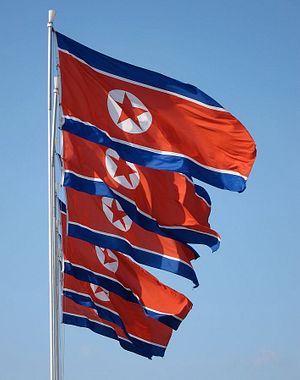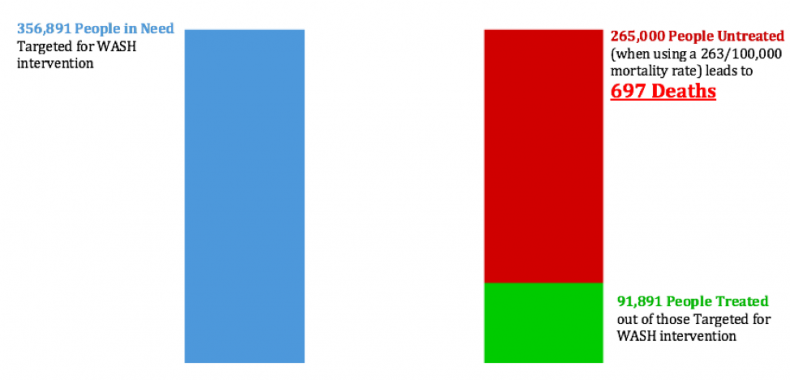In 2018, the United Nations agencies intended to provide 356,891 North Korean people with clean water and sanitation. Unfortunately, the UN only reached 91,891 people, leaving 265,000 people without clean water and sanitation. This may have caused up to 697 deaths.
According to the Center for Disease Control (CDC), worldwide, 780 million people do not have access to clean water, while “2.5 billion people lack access to improved sanitation.” In the Democratic People’s Republic of Korea, in 2018, the UN reported that there were 5.7 million people in need of clean water and improved sanitation and hygiene (WASH).
Unsafe water and sanitation cause mainly bacterial and parasitic infections such as shigellosis and lymphatic filariasis. Shigellosis often leads to bloody diarrhea and may cause anemia and acute kidney failure, while lymphatic filariasis causes severe inflammation, which may cause pain and social rejection by communities due to disfigurations.
We estimated the number of deaths that can be attributed to the inability to fully carry out the WASH programs by UN agencies in North Korea in 2018. North Korea’s death rate in 2018 was 9.3 per 1000 people. This leads to about 236,000 people dying in North Korea last year from all causes.
According to the Center for Disease Control, 6.3 percent of all deaths can be avoided with clean water and sanitation; in North Korea this translates to 15,000 deaths (236,000 x 0.063) that could be avoided by WASH interventions.
A crude case fatality rate (xx/100,000 at risk) can be estimated by dividing these 15,000 deaths by the 5.7 million people at risk and then multiplying by 100,000, i.e. 263 deaths per 100,000 people at risk. Applying this to the unreached population of 265,000 leads to an estimate of 697 deaths that can be attributed to the UN agency’s inability to carry out its 2018 WASH programming in full.
While it is possible that this number of deaths is an overestimate considering that humanitarian aid groups have done well in regards to distributing oral rehydration salts and other treatments, these treatments neither boast a 100 percent treatment rate nor have the capacity to treat all diseases caused by WASH.
Rather, there is a possibility that 697 deaths is an underestimate. While we used the global statistic that at least 6.3 percent of all deaths could be prevented, this statistic includes developed countries such as France and the United Kingdom, so the percentage in an undeveloped country such as North Korea should be higher.
The people of North Korea suffer a great deal due to a lack of clean water and proper hygiene and sanitation. Humanitarian aid only reached 91,891 of the millions suffering from WASH which led to an estimated 697 deaths. The limited assistance that humanitarian groups were able to give was mostly caused by sanctions and funding gaps.
As Jessup Jong and Kee Park have shown, the average delays for aid due to sanctions were 99 days; such delays must have capped and lowered the efficacy of the intervention. Additionally, WASH programs only received $2 million out of the $9.5 million that were requested, which further lowered the effectiveness of the program. We must remember that the lives of ordinary civilians must never be placed at risk; we cannot harm them for political gain. As the saying goes, Fiat justitia ruat caelum — Let justice be done though the heavens fall.
Jeongyoon Kim is a research assistant at the Program in Global Surgery and Social Change at Harvard Medical School and a rising senior at Bowdoin College majoring in Physics and Mathematics. Follow him on Twitter @AndrewXilKim.
Kee B. Park, MD, MPH, has visited North Korea 20 times as the director of the North Korea Programs at the Korean American Medical Association. He is a lecturer on Global Health and Social Medicine with the Program in Global Surgery and Social Change at Harvard Medical School. Follow him on Twitter @keepark.
































